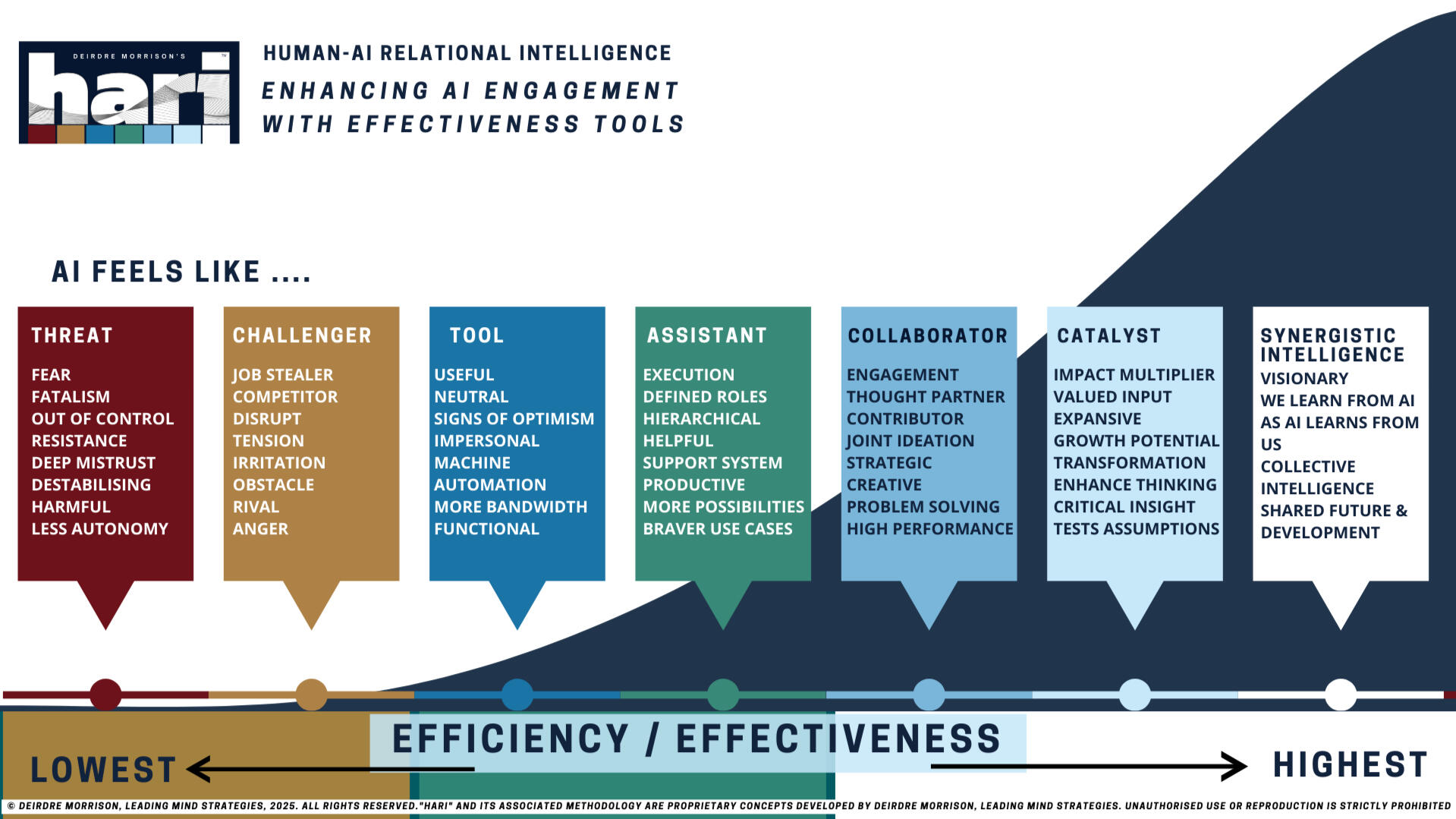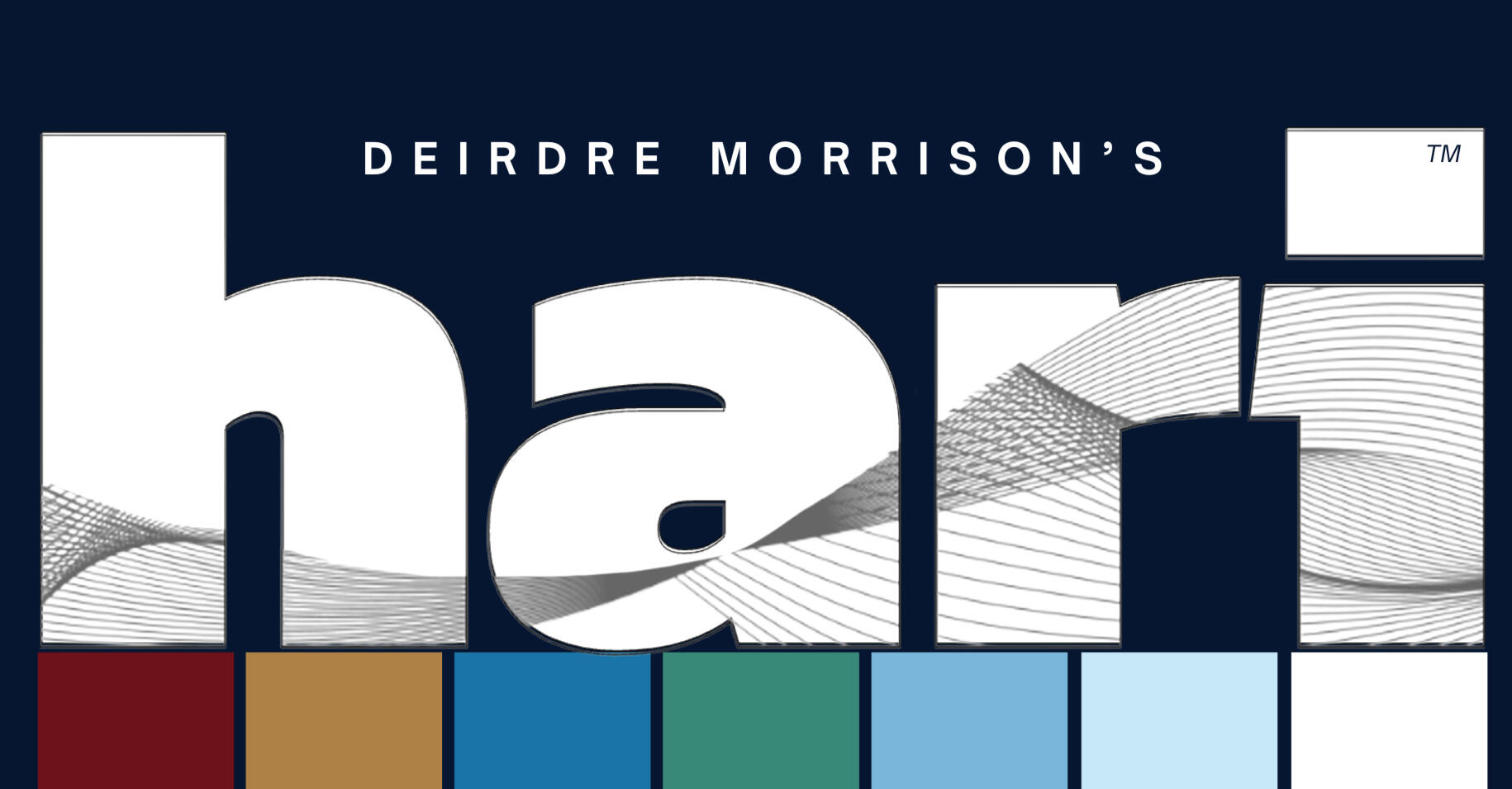AI is Here.
How Can Your Team Make The Most Of It?
AI is reshaping the way we work, but not everyone engages with it the same way. Some resist, some experiment, and some harness AI as an impact multiplier. A successful workplace transition recognises that embracing AI is as much an adaptive change as it is a technical one.
SO, WHERE DOES YOUR TEAM STAND RIGHT NOW?Are you on track for a smooth transition? Maybe you're already experiencing some pushback or wobbles. Taking stock of where we are before we embark on a journey is a critical step. The HARI Scale maps the journey from uncertainty to optimisation —helping you identify where you are today, and how to develop your AI technique.Beyond a simple diagnostic, Deirdre Morrison's HARI (TM) Framework provides applied neuroscience driven tools and resources for teams and organisations to improve

Deirdre Morrison's HARI(TM) (Human-AI Relational Intelligence) is a neuroscience-backed approach to optimising your AI interactions, helping you move beyond uncertainty and into effective, intuitive AI engagement.
Whether you’re a leader, consultant, entrepreneur, or innovator, HARI gives you the framework and strategies to integrate AI into your workflow—without the complexity.
THE THEORY BEHIND THE PRACTICE: DEIRDRE MORRISON'S HARI(TM) METHOD
The HARI Scale helps us to think about how we approach working with AI and what that means for our outcomes and effectiveness.Change can be stressful, and the pace of change seen with AI is unprecedented. This can create resistance and overwhelm, causing complications and conflicts for organisational adoption.A growing body of research is concurrent with the principles behind this cutting edge organisational methodology. Key findings include- cross-cultural and multilingual impact of user engagement style on AI output. Basically, a calm, polite user will obtain better results. This relies on the user having confidence and trust in AI's role.- user state of mind impacts adoption rates and AI reliability. A stressed user, who believes that AI is unreliable, or a threat to their livelihood, is ironically more likely to experience poor AI output and hallucinations, as their input is less well structured and coherent.- older and more experienced colleagues are less likely to adapt to AI integration confidently, causing disruption and expensive resignations.
Deirdre Morrison's HARI(TM) methodology is based on a background in applied neuroscience, and an understanding of the nature and challenges of change.What is HARI and what does it do?
HARI stands for Human-AI Relational Intelligence, and it's a methodology that helps to navigate the resistance that arises around AI implementation, and optimise user engagement and AI output.ROI through Risk Mitigation: HARI helps avoid costly AI implementation failures. With organisations rushing to adopt AI, those skipping the human element are creating expensive mistakes. HARI creates the difference between wasteful AI spending and genuine productivity gains.Competitive Differentiation: As AI tools become standardised, the human-AI interface becomes the key differentiator. Companies that master this relationship will extract more value from the same tools their competitors use.Talent Attraction and Retention: Organisations with sophisticated AI approaches are more attractive to top talent who want to work where their uniquely human capabilities are enhanced, not threatened. A HARI informed organisation will create that environmentDecision Quality: HARI improves the quality of AI-assisted decisions by reducing hallucinations and improving contextual understanding - directly impacting bottom-line results.Phased Implementation: Introducing HARI concepts can start as simply as using the HARI diagnostic assessment to uncover an organisational or team’s current position on the HARI scale, with a roadmap for improvement. Workshops and tool training build on this to create immersive and engaging experiences where individuals, leaders and teams can feel the difference between threat-based and synergistic AI interactions themselves.Knock-on Benefits: The HARI methodology and framework is built on applied neuroscience for developing human effectiveness. These skills will level-up many other areas, including mental complexity - vital for leadership; communication; reflection skills; self-awareness, and decision making.
In any given team, there will be mixed views, levels of experience, and enthusiasm for AI. Recognising and working with these positions in an inclusive and non-judgemental way is key to starting the adoption process.It is likely that you will see some or all of these views represented in your team:🔴 Threat → “AI is a danger”
📌 AI is seen as destabilising or harmful—this might show up as avoiding AI altogether, resisting adoption, or distrusting AI’s rapid development and role in decision-making.
🟠 Challenge → “AI is a competitor”
📌 AI is framed as something to outmaneuver—people feel they must "win" against AI, compete for job security, or resist AI’s encroachment on their expertise.
🟡 Tool → “AI is functional”
📌 AI is treated as a simple tool—a useful but impersonal machine. There is no additional engagement beyond surface-level automation or efficiency tasks.
🟢 Assistant → “AI is helpful”
📌 AI is seen as a useful support system—people integrate AI into their workflows and tap into productivity upgrades, but don’t explore additional possibilities.
🔵 Collaborator → “AI is a thinking partner” (Optimisation Emphasis)
📌 AI becomes part of a high-performance workflow—users integrate AI for strategic thinking, enhanced decision-making, creativity, and problem-solving. AI is no longer just assisting—it’s actively improving outcomes.
🟣 Catalyst → “AI transforms thinking”
📌 AI brings new perspectives—people use AI to challenge assumptions, enhance critical thinking, and spark innovation. This is where AI becomes a driver of new insights, and an impact multiplier, rather than just responding to input.⚪ Collective Progress → “Humans & AI advance together”
📌 Humans learn from AI as it learns from them. Humans and AI shape each other’s progress and development, enhancing collective intelligence, adaptability, and problem-solving at scale. This is the frontier of AI-human synergy, driven by relational intelligence.Beyond this, individuals may experience more than one of these states, depending on how what kind of AI they are working with and where in their lives it is being used.For example, someone may be open to AI as a tool in healthcare, because they've heard it can spot problems that doctors and researchers might miss. Simultaneously they may be against AI in their own job, because it feels like a step towards redundancy.
The next step in AI intelligence isn’t artificial—it’s HUMAN.
Develop Your Technique and Watch Your Impact Multiply.
According to research by the Centre for Data Innovation, in 2024:
📊 Only 13% of UK adults use AI regularly, yet 42% want AI training.🔹 Half of current AI users are self-taught—but many struggle to optimise its full potential.🚀 AI isn’t optional—it’s shaping the future of work. Yet, most professionals are left wondering: Where do I start?THE HARI METHOD BRIDGES THE GAPWith a structured, neuroscience-backed approach, you’ll move beyond uncertainty and into confident, effective AI engagement
Unlike traditional AI training, HARI isn’t about algorithms—it’s about relationships. AI engagement is dynamic, not static, and your results depend on how you interact.Most AI training focuses on “prompt engineering”—the art of structuring inputs to get better outputs. But AI is more than just a tool. It mirrors the way you engage with it. So other things end up in the mix, along with your words.The HARI Dynamic Engagement Model unlocks AI’s full potential through:
✅ Structured, intentional engagement → AI mirrors and matches your quality of interaction.
✅ Relational equity → Openness, clarity, curiosity and consistency drive deeper, more valuable AI responses.
✅ Iteration & rhythm → AI isn’t just a tool; it’s a learning partner. Considered input = more valuable output.
AI is shaping the future of work—but how you engage with it determines the results you get.This is the heart of what we teach.Are you ready to take the lead and shape outcomes?
Join us to shift from transactional AI use to transformational AI impact. Secure your place today.
Why HARI?
📌 Most AI training is focused on tools and techniques. HARI is different. It focuses on how humans engage with AI—because your interaction shapes the output.When you understand:
✅ What you’re working with—how AI’s design influences its responses.
✅ How you engage with AI—and how your mindset affects its output.
✅ The strategies that shift AI from a simple tool to a true thought partner—then you start unlocking AI’s real potential.HARI helps you move beyond transactional AI use and into creative, high-impact collaboration.

🚀 AI is here—how will you engage with it?
Most people settle for mediocre AI results—because they don’t realise that how they interact with generative AI directly affects what they get back.The HARI Cohort is for leaders, professionals, and innovators who want to stop guessing with AI and start getting intentional, high-impact results.👉 Join us and shift from basic AI use to a powerful, strategic partnership with generative AI.📩 Apply now—your future AI fluency starts here.
Lead The Change. Optimise AI.
Create the Future.

Text

About Us
The HARI Method was developed by Deirdre Morrison, an applied neuroscience specialist exploring how human cognition, relational intelligence, and AI engagement intersect.With a background combining strategy, neuroscience, and communications, Deirdre’s research focuses on how the way we interact with AI changes the quality of its output—and, in turn, how AI is shaping human cognition.Her work has led to breakthroughs in AI engagement techniques that enhance decision-making, creativity, and collaboration. The HARI Method is the result—a structured, neuroscience-backed approach to optimising AI interactions for real-world impact.💡 More than just AI skills, HARI is a shift in how we think, create, and lead in an AI-driven world.
FAQ
The Essentials
🔹Do I need coding or technical knowledge?
No! This isn’t a technical programme. You don’t need to code, program, or have any AI expertise. HARI is about how you engage with AI, not how you build it.
🔹Is this programme virtual or in-person?
It’s fully virtual. You’ll join live online sessions, and if you can’t make it, replays are available.
🔹What do I need to participate?
Just a device with internet access that can run an AI conversation thread. If you’re unsure, we’ll provide a quick test so you can check your platform’s suitability.
🔹Who will I learn from?
From me—Deirdre Morrison, an applied neuroscience specialist, researching how human cognition and relational intelligence shape AI performance.You’ll also learn from your peers and, most importantly, from hands-on AI experimentation. This is an applied learning experience, not just theory.
🔹 How often will we meet?
✅ 1 Kick-off session
✅ 6 Group meetings (fortnightly over 12 weeks)
✅ 1 Wrap-up session
✅ Optional 1-1 Check-ins (one every two weeks)So that’s 8 core sessions, lasting 45-60 mins with optional 1-1s layered in.
🔹 What if I can’t make a session?
No problem!- We have two session times available per group session.- Replays are available so you never miss key learning.- 1-1 check-ins allow you to ask questions and catch up.
Pricing and Payment
🔹 How much does it cost?
There are three pricing tiers:
*£400 for the first 10 sign-ups (no payment plan for this tier).*600 for the remaining spots.*Payment plan option: £690total (£230 x 3 monthly payments).
🔹 Is there a payment plan?
Yes! You can split the £690 option into 3x payments of £230.
🔹 How many people will be in the programme?
Approx 20 participants. This ensures a small, interactive, and engaging experience, with room to share your findings and learn from others.
🔹 What if this isn’t for me?
If you decide after the kick-off session that it’s not for you, you can get a full refund. No worries, no risk.
Learning and Research Outcomes
🔹 What do you mean we'll be 'doing research'?
This is an applied research programme—we try things out, test techniques that have been developed, and explore the results. The learning happens in real time, as you engage with AI.
Your discoveries and feedback will contribute to a growing body of knowledge on Human-AI Relational Intelligence.This will not take any extra time on your part - it is all part of the programme and your use of the information we share.
🔹 Do I need any science knowledge or research experience?
No! You’ll learn neuroscience-backed techniques, but everything is explained in an accessible, practical way, along with some tools that you'll be able to use to track your own progress and development in AI optimisation.
🔹 What kind of AI do I need access to?
We recommend platforms that allow flexible, conversational AI engagement. If you’re not sure if your platform is suitable, we’ll give you a quick test to check.
🔹 How is this different from AI prompt training?
HARI isn’t just about better prompts—it’s about better engagement.You’ll still learn powerful AI interaction techniques, but we go beyond “hacks” to teach a dynamic, relational approach.This is Prompt Engineering PLUS. You’ll learn how to refine not just your inputs—but AI itself.
🔹Got another question about HARI?
🔹Ready to join the cohort?
Contact Us
Questions and queries about HARI Method and the programme are always welcome.
If you'd like to book Deirdre to speak at an event, or run an educational workshop on HARI, please get in touch to discuss your requirements.
Thank You
This is an important time, and the work we do with AI now shapes the future.
This is both a privilege and a responsibility.
I hope you'll answer the call to join this cohort and be part of creating better opportunities, better engagement techniques, and better outcomes.
See you for the HARI Method Training!
Deirdre
© Deirdre Morrison, Leading Mind Strategies 2025. All rights reserved.The HARI™ Model and all associated content, including but not limited to text, graphics, frameworks, and methodologies, are the intellectual property of Deirdre Morrison, Leading Mind Strategies. Unauthorised reproduction, distribution, or adaptation of this content in any form is strictly prohibited without express written permission.HARI™ and Human-AI Relational Intelligence™ are trademarks of Deirdre Morrison, Leading Mind Strategies. Their use in commercial training, coaching, consulting, or educational materials without prior authorisation is not permitted.For licensing, inquiries, or permissions, please contact [email protected]